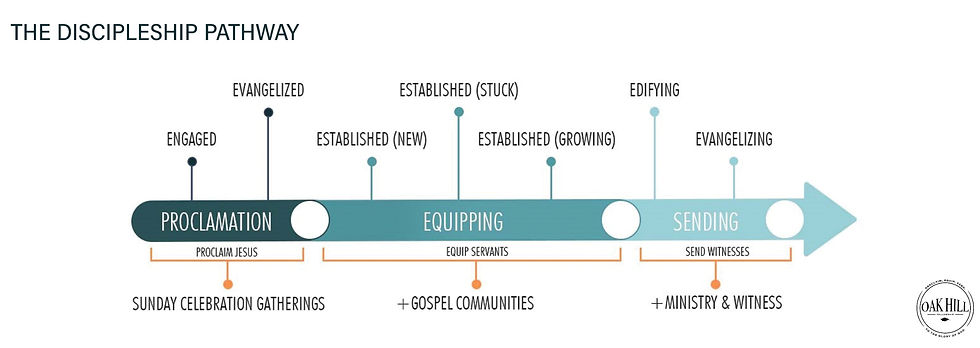Seven Nudges Toward Better Sermon Discussion - Part 2
- Pastor Ben
- Mar 15, 2022
- 4 min read
In part 1 of this series, I outlined the first four of seven nudges we can use to push our Gospel Communities toward better sermon discussions. While the concept of sermon discussion might seem simple enough on the surface, not all sermon discussions are created equal. We must understand the why and the what behind sermon discussion to more effectively participate so that everyone walks away built up in their faith.
The first four nudges were:
From Generic Truisms to Scriptural Truth
From Closed Questions to Open Questions
From Observation/Interpretation to Application (Heart Response)
From Vague Generality to Clear Specificity
Here are nudges 5-7 that you can apply the next time you are discussing a sermon with a Gospel Community:

5. From “Them Out There” to “Us Right Here”
Even in a smaller group, we avoid getting too personal. Therefore, well often talk about a generic group such as “some people” or “Christians I’ve seen” rather than talking about what they specifically deal with. We will talk about “the problem with the church in America,” but avoid examining whether we contribute to that problem.
In one sense, it can be helpful sometimes to allow people to acknowledge general cultural observations within the church or society at large. However, the point of these observations must never be to disparage other believers or churches, but to observe how cultural thinking (“Christian” or otherwise) has crept into our thinking. To do this, we can simply ask follow-up questions like, “How has that cultural perspective impacted your own thinking?” In the end, we want to make sure we get to the point of asking, “How can I be a more devoted follower and how can we be a more faithful church?”
6. From “Expert Mentality” to "Contribution Mentality”
It is natural and common for a gospel community to perceive one or two people as “the experts” in the group. Often, they will assign this mantle to the leader, the most educated, and/or the most vocal. These “experts” can serve a role in the group, but if we aren’t careful, they can dominate the discussion while the rest of us allow them to do all the deep thinking for us. In the body of Christ, every member is valuable, and therefore every member should seek to contribute so that the whole body is built up.
You can think about the role of the discussion facilitator like a tennis racket rather than hockey net. Both of them are made of are cross-woven strings, but they perform very different functions. The hockey net is designed to catch and keep the ball or puck. A discussion facilitator who is a hockey net will always get the last word, and the momentum of the conversation will always be moving in their direction. A tennis racket, conversely, is a designed to deflect the ball back to the others. A discussion facilitator who is a tennis racket will ask questions like, “What do the rest of you think?” and make sure the others get to hit it too.
In fact, a good sermon discussion is more like a double’s tennis match in which the facilitator doesn’t even hit the ball every time but gives other group members space to respond to one another. My favorite discussions to lead are those in which the group is so engaged in the conversation and what others are saying that I rarely need to “hit the ball.”
7. From Obstacle to Opportunity
Spiritual growth is daunting. There are many things that stand in our way. It is easy to see the obstacles to growth, but it is often hard to see the opportunities for growth. Often, we raise many excuses for why growth is hard, which can be helpful to acknowledge. However, we rarely call those excuses out for what they are and point one another to the opportunity for growth in front of us.
The truth is, our obstacles to growth are usually the same as the opportunities for growth. If I am convicted about speaking harshly to my kids, my excuse might be, “When I am tired at the end of my work day, I just don’t feel like I have it in me to be patient.” However, this is the very opportunity for growth. The point is that I have seen the fruit of my heart, and I need to go to Jesus in prayerful dependence, asking him for the love and energy needed to patiently parent my kids. Further, this realization might lead me to explore other healthier patterns of work and sleep and schedule and a litany of other topics.
As you hear others talk about their obstacles to growth, draw them out through good open-ended questions. Identify with the difficulty of growth in a fallen world. Identify with suffering and remind them of Christ’s care for them. Ultimately, remind them of the freedom Christ brings over the power of sin, and the presence of the Holy Spirit with them. Remind them that in order to put on, we must first put off. And in order to put off, we must also put on. Remind them that their obstacle is the opportunity to see the Lord do awesome things in their life if they would go to him in faith.
These nudges could lead to some incredible heart-level conversations every time your Gospel Community gathers. I believe God will use you, and the others in community with you, as his tools for redemptive growth in one another’s lives.
Considering the list above, which one or two nudges do you want to apply in the next three months? How will you apply them?




Comments